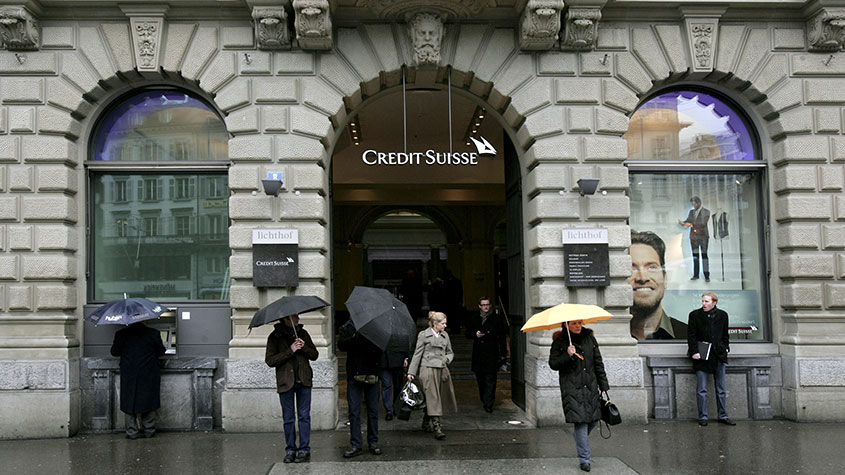What’s happened to Credit Suisse stock?
Credit Suisse stock has slumped on rumours that the bank is in trouble. Is there any truth in this speculation?


Get the latest financial news, insights and expert analysis from our award-winning MoneyWeek team, to help you understand what really matters when it comes to your finances.
You are now subscribed
Your newsletter sign-up was successful
Want to add more newsletters?

Twice daily
MoneyWeek
Get the latest financial news, insights and expert analysis from our award-winning MoneyWeek team, to help you understand what really matters when it comes to your finances.

Four times a week
Look After My Bills
Sign up to our free money-saving newsletter, filled with the latest news and expert advice to help you find the best tips and deals for managing your bills. Start saving today!
Credit Suisse stock has plunged nearly 58% this year as the bank has fought off scandals and reported large losses. And the selloff in the shares has only accelerated in the past week as rumours about the group’s financial health have started to grow online.
The headwinds hurting Credit Suisse stock
Credit Suisse is in the middle of a crisis, says Ben Martin in The Times. Executives at the “troubled bank” have failed to allay investors’ fears about its “financial health”.
The problem began last week when worries started to circulate “that the lender could be in trouble”. In response, executives “raced to bolster confidence in the loss-making group” through a series of telephone calls. However, the slide in the Credit Suisse share price, which at one stage reached 12% on Monday, and the rise in the cost of insuring its debt against default (measured by credit default swaps) suggest that “those efforts have fallen short”.
MoneyWeek
Subscribe to MoneyWeek today and get your first six magazine issues absolutely FREE

Sign up to Money Morning
Don't miss the latest investment and personal finances news, market analysis, plus money-saving tips with our free twice-daily newsletter
Don't miss the latest investment and personal finances news, market analysis, plus money-saving tips with our free twice-daily newsletter
The spike in borrowing costs and the fall in Credit Suisse stock is a little extreme given that “there was no obvious bad news to explain the moves”, says Liam Pound on Breakingviews.
What’s more, its managers have a point when they argue that “its liquidity and capital position are strong”.
After all, as of June, Credit Suisse had a “respectable” common equity Tier 1 capital ratio of 13.5%, as well as CHF232bn of liquid assets, around “the sum of its short-term borrowings and quickly-accessible customer deposits”. As a result, “it would take a very large loss or sudden withdrawal of funding to bring the bank to the brink of failure”.
Credit Suisse’s chequered history
Still, it’s not surprising that investors are developing jitters, says Lex in the Financial Times.
Credit Suisse stock definitely “has all the makings of an easy short”. It has had a “chequered history” over the past few years, with losses from the Archegos and Greensill scandals.
There has also been a “revolving door of managers”, with Credit Suisse’s new chief financial officer, Dixit Joshi, starting last Monday. It might be a good idea for CEO Ulrich Körner to “bring forward a promised clean-up”.
Prioritising the strategy announcement is definitely a good idea given that the bank’s third-quarter earnings results, due at the end of this month, are unlikely to be strong enough to reassure investors, says Rochelle Toplensky in The Wall Street Journal. The “broad outlines” – a “scaled-back investment bank and some swingeing cost cuts” – are already known.
However, investors are unsure whether Credit Suisse “will quickly cut the investment bank, which [is likely to] require raising capital at a painfully low valuation”, or instead “try to self-fund the cull, which would therefore need to be slower and narrower”.
Whatever happens, the recent volatility in Credit Suisse stock and credit-default swaps highlights the “deeply unforgiving” mood of the market, says Ben Marlow in The Daily Telegraph.
When a CEO of a major global bank is “drowned out by entirely unfounded speculation on Twitter and internet forums”, some of which came from the account of a YouTube DIY property investor, something has seriously gone wrong. It is clear that in this febrile environment, investors are “looking for any excuse to sell”.
Get the latest financial news, insights and expert analysis from our award-winning MoneyWeek team, to help you understand what really matters when it comes to your finances.

-
 Should you buy an active ETF?
Should you buy an active ETF?ETFs are often mischaracterised as passive products, but they can be a convenient way to add active management to your portfolio
-
 Power up your pension before 5 April – easy ways to save before the tax year end
Power up your pension before 5 April – easy ways to save before the tax year endWith the end of the tax year looming, pension savers currently have a window to review and maximise what’s going into their retirement funds – we look at how
-
 Halifax: House price slump continues as prices slide for the sixth consecutive month
Halifax: House price slump continues as prices slide for the sixth consecutive monthUK house prices fell again in September as buyers returned, but the slowdown was not as fast as anticipated, latest Halifax data shows. Where are house prices falling the most?
-
 Rents hit a record high - but is the opportunity for buy-to-let investors still strong?
Rents hit a record high - but is the opportunity for buy-to-let investors still strong?UK rent prices have hit a record high with the average hitting over £1,200 a month says Rightmove. Are there still opportunities in buy-to-let?
-
 Pension savers turn to gold investments
Pension savers turn to gold investmentsInvestors are racing to buy gold to protect their pensions from a stock market correction and high inflation, experts say
-
 This fund will benefit from rising interest rates
This fund will benefit from rising interest ratesFinancial stocks have underperformed but the sector might be in for an upswing, says Max King. Buy this trust to benefit.
-
 Where to find the best returns from student accommodation
Where to find the best returns from student accommodationStudent accommodation can be a lucrative investment if you know where to look.
-
 The world’s best bargain stocks
The world’s best bargain stocksSearching for bargain stocks with Alec Cutler of the Orbis Global Balanced Fund, who tells Andrew Van Sickle which sectors are being overlooked.
-
 Revealed: the cheapest cities to own a home in Britain
Revealed: the cheapest cities to own a home in BritainNew research reveals the cheapest cities to own a home, taking account of mortgage payments, utility bills and council tax
-
 UK recession: How to protect your portfolio
UK recession: How to protect your portfolioAs the UK recession is confirmed, we look at ways to protect your wealth.